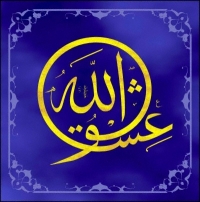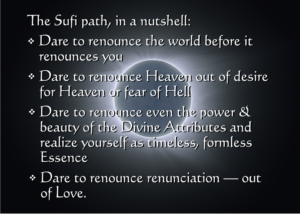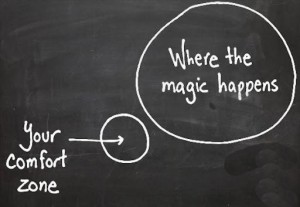
If you have to ask what Jazz is,
you’ll never understand it.
—Louis Armstrong
You might have heard of “sufis.” Perhaps you have heard the terms “Whirling Dervish,” or “Sufi Dancing.” Perhaps you know that Rumi, the 13th-Century Persian mystic who has been the best-selling poet in America for the last thirty years, was a “sufi.” Maybe you looked up “sufi” in the dictionary and found “Islamic mystic” — which doesn’t actually help much. So what’s a “sufi,” really? What is “sufism?”
It’s a reasonable question, but nearly as hard to pin down as “jazz.” One of the problems is that the bulk of what’s been written academically about something called “sufism” was written by outside observers with a lot of preconceptions and who are often promoting their own ideological biases under the guise of “expertise.” On the other hand are Muslim ideologues with an agenda of promoting Islam, who insist that Sufi practice is only legitimate in the context of personal Islamic religious practice.
To make it worse, as many actual Sufis you ask, as many answers you’ll get, since the shape of the Sufi work is adapted to the culture in which it is practiced.
So let’s start with the word “Sufism.” The “-ism” part is an unfortunate linguistic convention; it implies a doctrine or dogma where in fact there is none. It also implies a fixed or recognizable form, and there is none of that, either historically or in the present day. The Sufis themselves do not call their work “Sufism,” except as a conversational expediency. Their own name for it is Taṣawwūf, which means, more or less, “The Way of the Sufi.”
“Belief,” in the sense of “subscription to a premise,” is totally foreign to the nature of the Sufi “way.” So there is nothing you have to accept or do first to set out on the Sufi path; you don’t even have to believe in God. If you believe in yourself, even just a little tiny bit, that’s enough. To quote Hazrat Inayat Khan, the first Sufi teacher in the West: “The Sufi is free from belief and disbelief, and yet gives every liberty to others to have their own opinion.”
He continues: “Strictly speaking, Sufism is neither a religion nor a philosophy; it is neither theism nor atheism, but stands between the two and fills the gap. Among religious people, Sufis are viewed as ‘free-thinkers,’ while among intellectual philosophers they are considered religious, because they make use of subtler principles to elevate the soul than can be followed by material logic. If ever it could be called a religion, it would only be as a religion of love, harmony, and beauty. If it be called a philosophy, it is beyond that because a Sufi kindles the fire of devotion while keeping eyes open to reason and logic.” To the atheist, the Sufi will say, “I don’t believe in the God you don’t believe in, either.”
So if it’s not a religion or a philosophy, if there are no beliefs — what are Sufis about, anyway?
The aim of Sufi practice is the embodied development of latent human potentials under divine guidance — with or without the vehicle of a religion or theology. These potentials are present in everyone: We all possess the capacity for deep love, deep fulfillment, deep self-confidence, fearlessness, and deep joy as our immanent inner wealth. The path of the Sufi is the path of the heart — the Path of Love — and it is a path of direct personal experience. As the Sufis say, “The one who tastes, knows.” So uncovering the nature of the spiritual heart and of “divine guidance” is an ongoing, deepening discovery of oneself through one’s own experience. What emerges through the Sufi inquiry is truly authentic to oneself, not something adopted from someone else.
The proposition that one does not need an external yardstick, doctrine, or rulebook is really spooky to those who need conformity and who have lost their internal moral compass. But that is, indeed, the way of true inner freedom.
If your knowledge of fire has become certainty by words alone,
then seek to be cooked by the fire itself.
Don’t abide in borrowed certainty.
There is no real certainty until you burn;
if you wish for this, sit down in the fire.
— Rumi, Mathnawi II:860–861
Version by Camille and Kabir Helminski
In this, love is both the fuel and the vehicle, and one begins to experience the all-pervading nature of love, not just in personal relationships but as a kind of subtle geometry underlying, supporting, and evolving the whole of reality. It is love that has the unique power of beckoning us forth out of our felt-sense of smallness and limitation into the boundlessness, grandeur, and deep fulfillment of our real selves.
The aim of life is to live, and to live means to be aware, joyously, drunkenly, serenely, divinely aware.
—Henry Miller
And when love becomes one’s pole-star by which to navigate the ocean of life, one always acts in integrity.
“Sufism” isn’t actually “learned.” It’s just what’s there when you unlearn everything that is false about yourself.
What distinguishes the Sufis from other inner-work schools is this emphasis on the heart as the locus of the integration and refinement of the totality of our being. So what is often termed the “ego” in spiritual parlance is not considered to be a “problem” that we are somehow “wrong” or unspiritual for having and must therefore “fix:” If love is indeed all-pervading, there can be nothing truly separate from love, including our messy egos. An epigram often attributed to Rumi says, “Your task is not to seek for love, but merely to seek and find all the barriers within yourself that you have built against it.” Our daily life is the laboratory and classroom of our self-discovery, our every experience offering us the choice of stale banality or a further step into our unconditioned, inherent wisdom and magnificence. The Sufi lives a full, balanced human life even while touching transcendence — so every experience, every emotion, every relationship, every triumph and disaster is given to us, by the movement of evolution of the whole Universe, to help us on our journey into our own greater possibilities.

The role of the Sufi teacher is in all ways to support this movement, and help the student avoid the worst of the pitfalls and dead-end side trips that, when traveling new territory, can seem very inviting at the time. There are spiritual practices that accelerate and deepen the unfoldment, and the teacher is the physician who prescribes the remedy. The Sufi teacher is not the deified guru or “Perfect Master” of other traditions, but in keeping with the focus on the heart, is one who has been the route ahead and has returned to walk beside the seeker as a friend and companion on the immense, timeless caravan of souls on which all, without exception, are returning to Wholeness.
I recently came across this, in Googling the history of Sufis and coffee (which the Yemeni Sufis invented). I hope you find it fun and useful: https://www.youtube.com/watch?v=AjvX0o9uibk
If you would like a bit of historical background on “Universal Sufism” in the West, go here.
If you want a totally non-intellectual view of the “way” of the Sufi, go here.
Calligraphy ‘Ishq Allah, “God is Love,” by the author.
This is an article submitted in condensed form to Catalyst Magazine (http://www.catalystmagazine.net) in May 2013, a teaser for a teaching I gave in Salt Lake City in June 2013.



